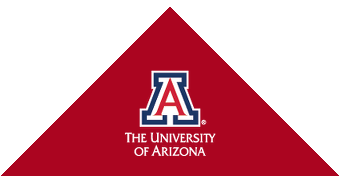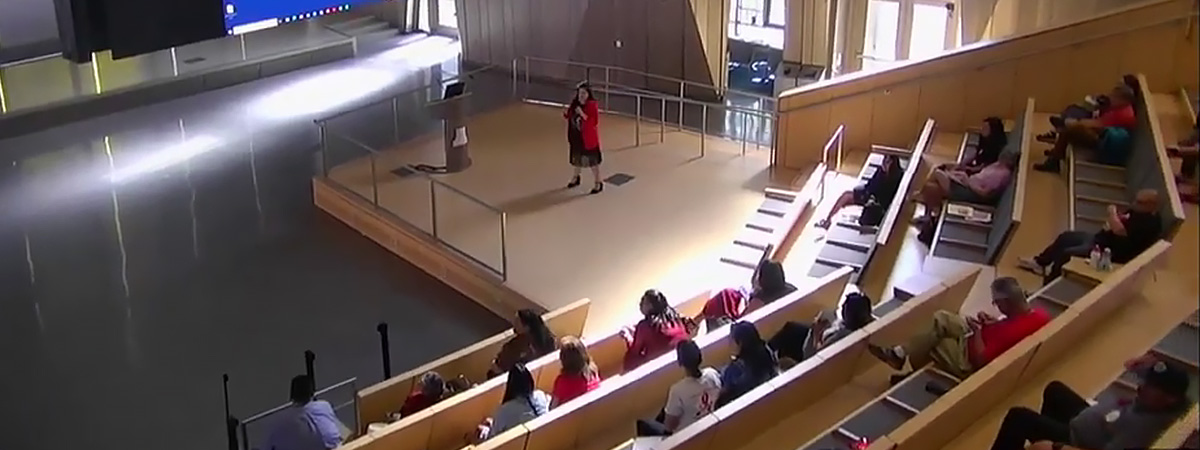
The IndigWellbeing program at the Zuckerman College of Public Health organized two events in May to raise awareness about the crisis of Missing and Murdered Indigenous Peoples – a Symposium and a 5K Run/Walk – and both events brought the community together for conversation, connection, and healing.
The IndigWellbeing program at the UArizona’s Zuckerman College of Public Health organized two events in May to raise awareness about the crisis of Missing and Murdered Indigenous Peoples (MMIP), and to bring the community together for conversation, connection, and healing.
The first event, the third annual Missing and Murdered Indigenous Peoples Day of Awareness Symposium (MMIP Symposium) brought together speakers from many tribes, local and national agencies, and perspectives to discuss MMIP issues and solutions. The Symposium was held on May 3, 2024, in the Health Sciences Innovation Building (HSIB) on the University of Arizona Health Sciences campus in Tucson, AZ, on the traditional homelands of the Tohono O’odham and Pascua Yaqui. The presentations were recorded and you can watch the MMIP Symposium presentation videos here.
The second event, the fourth annual Southern Arizona Missing and Murdered Indigenous Peoples Awareness 5K Run/Walk, engaged a wide range of community partners to find common purpose and increase awareness of this important issue. The event was held on Sunday, May 5, 2024, at Brandi Fenton Park in Tucson, AZ, and drew more than 250 participants along with many community organizations who joined to support the run and the cause.
An Annual Day of Awareness
Annually, May 5 is National Missing and Murdered Indigenous Persons Awareness Day. According to the Bureau of Indian Affairs, Native American and Alaska Native rates of murder, rape, and violent crime are all higher than national averages. The Centers for Disease Control and Prevention reported that non-Hispanic American Indian and Alaska Native (AI/AN) females experienced the second highest rate of homicide in 2020 and non-Hispanic AI/AN males had the second highest rate of homicide compared with males in all other racial and ethnic groups. In addition, more than 2 in 5 non-Hispanic AI/AN women reported being raped in their lifetime.
The IndigiWellbeing program, launched by MEZCOPH Assistant Professor Felina Cordova-Marks, DrPH, MPH, MSc, organizes culturally grounded programming for Native and Indigenous students, staff, faculty and community members to build connection and awareness among participants as a path to health and wellness. Both events were organized by the Indigiwellbeing program and coordinated by Dr. Cordova-Marks and MEZCOPH PhD Candidate William Carson, MPH. For more information about IndigiWellbeing, visit publichealth.arizona.edu/outreach/indigiwellbeing.
Details of the MMIP Symposium
The MMIP Symposium brought together many experts, advocates, representatives, and community members.
In addition to the Zuckerman College of Public Health, the MMIP Symposium was sponsored by the Pascua Yaqui Tribe, the University of Arizona Health Sciences Office of Diversity and Inclusion, the Indigenous Resilience Center, the American Indian Studies Department, Collaboratory for Indigenous Data Governance, the UArizona Office of Native American Advancement and Tribal Engagement, and the CoVHORT research study.
The Symposium agenda included:
Welcoming Remarks
Felina Cordova-Marks, DrPH, MSc, MPH (Hopi)
Assistant Professor, Zuckerman College of Public Health
Director, IndigiWellbeing
Blessing
Miguel Flores Jr., LISAC, CSOTS (Pascua Yaqui and Tohono O’odham)
CEO, Holistic Wellness, LLC, Tucson, AZ
Opening Statement
Councilwoman Frias (Pascua Yaqui)
Tribal Council, Pascua Yaqui Tribe
Missing and Murdered Indigenous Women, Girls and Relatives: A growing International Human Rights Concern (Focus on Guatemala and US/Mexico Border)
Andrea Carmen (Yaqui)
Executive Director, International Indian Treaty Council (IITC)
Sewa U’Usim Community Partnership – Responding to MMIR with Youth Support, Culture and Community Healing
Joanne Cueller (Mexican, Inupiaq)
Brianna Valencia (Pascua Yaqui)
Update from the Arizona State MMIP Task Force
Alfred Urbina (Pascua Yaqui)
Attorney General, Pascua Yaqui Tribe
MMIR and Indigenous Queer, Trans, and Two-Spirit
Souksavanh Keovorabouth (Navajo Nation)
Assistant Professor, Northern Arizona University
Culture in MMIP Prevention Models: The 2024 MMIP Action Plan
Marisa Miakonda Cummings (Omaha Tribe of Nebraska)
MMIP Senior Policy Advisor, MMIP Subject Matter Expert
Administration for Native Americans, US Department of Health and Human Services
Public Health Approaches to MMIP
Lori McPherson, JD
Senior Policy Advisor with the Sex Offender Investigations Branch of the United States Marshals Service (USMS), Lead of the USMS MMIP Initiative
Sarah Blazucki, JD
Communications for the Office of Sex Offender Sentencing, Monitoring, Apprehending, Registering, and Tracking. Department of Justice (DOJ/SMART Office)
Closing Blessing and Thank You
Miguel Flores Jr., LISAC, CSOTS (Pascua Yaqui and Tohono O’odham)
CEO, Holistic Wellness, LLC, Tucson, AZ
Details of the MMIP 5K Run/Walk
The MMIP Run/Walk Core Planning Committee included: Dr Cordova-Marks, William Carson, Lourdes Escalante, JS Torres, and Melodie Lopez; with additional committee members for 2024: Dr Velia Nuno-Leybas, Blanca Alderate, Amanda Lam, Barbara Elgutaa, and Kateri Harris.
In addition to sponsorship from the Zuckerman College of Public Health, the MMIP 5K Run/Walk welcomed the participation of many community partners, including the Allianza Indigena Sin Fronteras, Tucson Indian Center, and sponsors: the San Xavier Co-op Farm, Natural Grocers, Kaotic Kitties, Go Guarded, Coffee Times, Pima County Health Department, and the Pascua Yaqui Sewa U’usim Circles of Care.
Before the run, MizSkoden provided attendees with music, Miguel Flores (Pascua Yaqui and Tohono O’odham) gave a blessing. The blessing was followed by a ‘Dance for Healing’ by Calpulli Teoxicalli, followed by a keynote address from the MMIP 5K Run/Walk’s 2024 Elder of Honor, Dr Selso Villegas (Tohono O’odham).
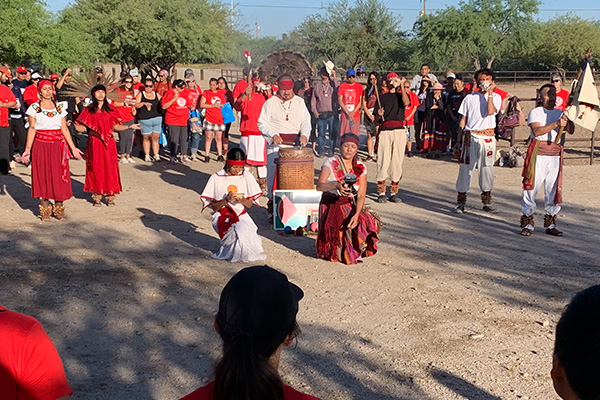
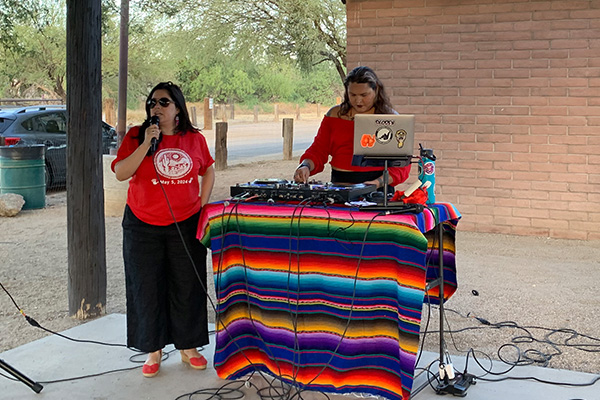
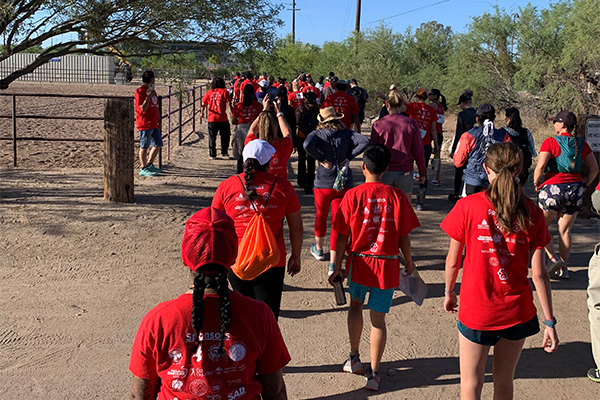
After the run, Tygel Pinto (Diné) played flute for everyone assembled and later MizSkoden (Yaqui) addressed the gathering on MMIP among the Two-Spirit community, followed by the Pascua Yaqui Youth Move, with Deija Moreno (Pascua Yaqui), a youth speaker representing their group. The event closed with drummers from The Haven Women’s Drum Group and a blessing from Miguel Flores.
Conclusion
The Zuckerman College of Public Health is proud to support the IndigiWellbeing program and the program’s annual MMIP events that help to increase awareness, find solutions, and heal communities. Thanks to everyone who supported the MMIP events this year in so many ways, from the attendees to our presenters, sponsors, artists and performers. Together we will build a safer, healthier community.
University of Arizona Land Acknowledgement
We respectfully acknowledge the University of Arizona is on the land and territories of Indigenous peoples. Today, Arizona is home to 22 federally recognized tribes, with Tucson being home to the O’odham and the Yaqui. Committed to diversity and inclusion, the University strives to build sustainable relationships with sovereign Native Nations and Indigenous communities through education offerings, partnerships, and community service.
# # #








